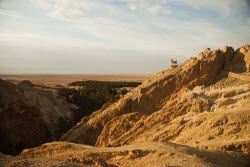|
 |
|
|
Algeria Country Information
Background
Algeria was occupied by French rule for more than a century between 1830-1962. The modern day borders of Algeria were formed during the French colonization. This country was once sought after by tourists from all over abroad and domestic and could easily be categorized among other top African countries such as Morocco. However, Algeria's tourist industry quickly evaporated when increased violence and terrorism swept through the country driven by political instability. There was plenty of conflict between the Islamic Salvation Front (FIS) and the High Council of State controlled by then president Mohamed Boudiaf who had returned to serve after 28 years of exile. However, even he was not able to reduce the violence that became increasingly random throughout the country. He also became a victim of his presidency and was assissinated in public by an Army Lt. that served in his military force. His name was Army Lt. Lembarek Boumarafi and he confessed that the assassination was carried out on behalf of the disoolved FIS party.
Since the 90s Algeria has been in this cyclical pattern of violence where it is unable to recover. Violence and terrorism continue to dominate Algeria and in the 90s there would be several terrorist groups that would lauch campaigns of violence against several government officials and institutions. They were angered that the government was suppressing Islamists and banning Islamist parties from forming. It was estimated that during this period more than 150K Algerians died at the hands of these terrorist campaigns.
There are still travelers who are willing to visit Algeria. Unless you are part of an aid convoy we please ask you to never travel alone here and make sure you arrange for safe transportation through a reputed company. Do not travel independently because in 2003 there were tourists who were abducted. The absence of visitors is truly unfortunate, as Algeria still has many interesting things to see and culture to experience. The tribal culture is still very present when you travel near to the town of Tamanrasset. If you head into the capital of Algiers you will be confronted by mix of its French colonial past and modern structures. In Timimoun you are reminded of the desert oasis towns seen from the movie Lawrence of Arabia; it is breathtaking. Do not attempt to backpack while in this country as it may pose too dangerous and your options will be limited. Be sure to travel safe through this vast nation and Algeria will be waiting for you. |
Geography
|
- Area: 2,381,740 sq. km (919,594.955 sq. mi.)
- Terrain: Desert and Plateau, few mountains, the northern area is coastal plain
- Climate: Arid adnd hot during the summers; Mild and wet during the winters along the northern coast. On the higher plateaus it is hot in the summers with cold winters. Common on the summer to have dust storms called sirocco.
|
People
|
Most of the Algeria population live along the Mediterranean Sea in the north. Close to have of the population do live in main urban cities and the country strives for further urbanization of other cities. There are about 1.5 million nomadic tribes living in the Saharan Desert area.
Most Algerians are Arab-Muslims or Arab-Berber mixes. There are non-Muslims as well, but they only comprise of about 5000 of the population There are no people of Jewish descent living here. Surprisingly there are about 1,100 Americans living in this country, and are mainly here to work in the oil industry companies.
|
Government
|
Algeria's original Constitution was ratified in 1976 after the revolutionary war against France with a cease fire agreement signed between France and the National Liberation Front (FLN) on March 18, 1962. Algeria was declared a sovereign country on July 3, 1962. A first president, Ahmed Ben Bella, was elected later that year in September, but a few years later in 1965 a non-violent coup headed by the Minister of Defense Colonel Houari Boumediene replaced Ahmed Ben Bella to become the formal second president. President Boumediene was credited setting the foundations for a modern Algeria.
Algeria has multiple political parties, but for the party to become official it must be approved by the Ministry of the Interior. The Constitution prohibits any party from forming on the basis of religion, language, race, gender or region. The President is considered the head of the state and government and will serve out a five year term. The President is responsible for appointing a Prime Minister and one-third of the Council of the Nation, the upper house parliament. The remainig parliament are elected by regional and municipal authorities.
|

|
|
|
|
 |
|
